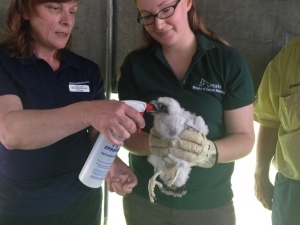The Canadian Peregrine Foundation welcomed the newest members of Windsor's peregrine falcon family on Friday.
Voltaire and Freddie produced three chicks, who were named and banded under the Ambassador Bridge.
The chicks have been named Tecumseh, Fighter and Gwennis. All are less than a month old. Each baby was pulled from the nest, weighed and then banded with a unique black recovery band.
“These birds are in our heart,” says Dennis Patrick, who first discovered the falcon’s nest six years ago. “They are wrapped there for life.”
Gwennis is named after Patrick and his wife Gwen.
The band is crucial to their survival. This year, the U.S. government legalized the harvest and trapping of peregrine falcons in migration, meaning every Canadian falcon is at risk, unless they're banded.
“Any bird that is legally harvested under permit that dons a recovery band, must be released and will not be held in captivity for the rest of its life," says Mark Nash, president of the Canadian Peregrine Foundation.
The physical exam and banding allows scientists to protect the falcon and monitor its movements.
“It's been a challenged year,” says Nash. “So far we've experienced a 50 per cent failure rate. Fifty per cent of all eggs that have been laid by these 21 diff pairs have failed to hatch.”
A successful hatching is a positive indication of human health and environmental conditions. Peregrine falcons are making a comeback, although they are still considered a threatened species.
In the next few weeks, the real fun begins. As the chicks learn to fly, volunteers are needed to keep a watchful eye.
“So when they leave, they are safe and out of harm’s way,” says Patrick.




































